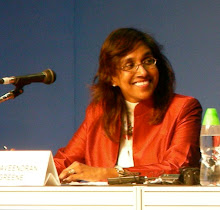
Oneness is a central theme of the Baha’i Faith which calls for the unity of mankind, for the recognition of the unity of the Godhead and the Manifestations, for unity of the sexes, and for unity of action after a decision has been made.
Abdul Baha has written
•“Unity is necessary to existence. Love is the very cause of life, on the other hand, separation brings death. In the world of material creation…all things owe their actual life to unity. The elements which compose wood, mineral, or stone are held together by the law of attraction..So is it with the great body of humanity.”
Baha’u’llah compared the world to the human body. Human society is composed not of a mass of merely different cells but of association of individuals, each of whom is endowed with intelligence and will…no cell lives apart from the body, whether in contributing to its functioning or in deriving its share from the well-being of the whole.”
The deeper implications of this Oneness of Mankind concept promulgated by Baha’u’llah more than a century ago, implies an organic change in the structure of present day society, a change such as the world has not yet experienced. It represents the consummation of human evolution- the next step is the high synergistic society where there will be a linking together of the consciousness of mankind..” This linkage is the linking of consciousness- a linking of soul-to-soul. More than just tolerance and coexistence.To go beyond a skin encapsulated ego. Beneath the skin, we are all one in spirit.
Baha’u’llah extols that
“The purpose of religion as revealed from the heaven of God’s Holy Will is to establish unity and concord amongst the peoples of the world; make it not the cause of dissension and strife. Consort with the followers of all religions in a spirit of friendliness and fellowship, …Wherever you find the attributes of God, love that person, whether he be your family or of another.”
Often though, culture seems to be a knowledge, some of it conscious and "pickled" into coded or traditional forms, such as myths and rules, some of it quite unconscious and automatic, such as the rules and structures that allow language speakers to understand each other. This knowledge is learned both formally and unconsciously within human groups and is heavily dependent upon language as a medium for transmission. Culture is shared between generations and within generations, but this sharing is neither completely homogeneous, nor without error. Humans, as individuals and as members of groups, use cultural assumptions to make sense of the world around them as they live out their lives. They also use culture to create strategies with respect to their group and individual interactions.
“This diversity, this difference is like the naturally created dissimilarity and variety of the limbs and organs of the human body, for each one contributeth to the beauty, efficiency and perfection of the whole. When these different limbs and organs come under the influence of man’s sovereign soul, and the soul’s power pervadeth the limbs and memebrs, veins and arteries of the bidy, then difference reinforceth harmony, diversity strengthened love, and multiplicity is the greatest factor for coordination.”
Baha’u’llah tells us “Ye are the fruits of one tree, the leaves of one branch.”
Abdul Baha reminds us:
“Consider the flowers of a garden: though differing in kind, colour, form and shape, yet inasmuch as they are refreshed by the waters of one spring, revived by the breath of one wind, invigorated by the rays of one sun, this diversity increaseth their charm, and addeth unto their beauty. Thus when that unifying force, the penetrating influence of the Word of God, taketh effect, the difference of customs, manners, habits, ideas, opinions and dispositions embellisheth the world of humanity..”
“Be generous in prosperity, and thankful in adversity. Be worthy of trust of thy neighbour, and look upon him with a bright and friendly face. Be a treasure to the poor, an admonisher to the rich, an asnwerer of the cry of the needy, a preserver of the sanctity of thy pledge. Be fair on thy judgment, and guarded in thy speech. Be unjust to no man, and show meekness to all men. …Let integrity and uprightness distinguish all thine acts. Be a home to the stranger, a balm to the suffering, a tower of strength for the fugitive…..”


2 Comments:
Beautiful post, I really enjoyed it! I've also enjoyed reading your thoughts on science and religion. I came across your blog from the bahaiviews blog. Looking forward to reading more...
Thanks for your encouraging words. I do so enjoy meeting Baha'is friends and others around the world and hope to share some of my perspectives on this site. Nice to know it is being read.
Post a Comment
<< Home